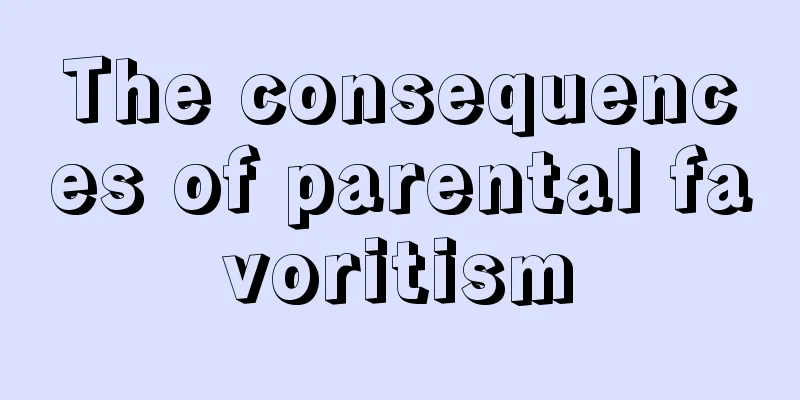The consequences of parental favoritism

|
As a family and as elders, you must know several steps, that is, it is not okay to be partial to your children, because partiality has a huge impact on children. If parents do not pay attention to this aspect, it will cause great changes in the children's future lives. Long-term partiality will cause great influence and impact on the children's psychology. As parents, you need to understand how to educate your children from all aspects. 1. Influenced by traditional feudal ideas Some parents believe that sons can carry on the family line, while daughters will belong to someone else's family after they get married, so they will especially pamper their sons and look down on their daughters. This may cause the sons to become arrogant and domineering in the long run, relying on their parents' pampering to do whatever they want, while the daughters will develop an inferiority complex and feel that no one loves them. 2. Children have different personalities Raising a child to adulthood is a very difficult task. In this process, parents need to go through numerous difficulties. Adding the pressure of work and life, they often feel breathless. If the child is sensible, obedient, sweet-mouthed and able to coax people in this situation for a long time, it will not only make the parents worry less, but also relieve their depressed mood, so they will prefer such children. On the contrary, if the child is naughty by nature and causes trouble outside all day long, or is too low-self esteem and timid to communicate with the outside world, parents will need to spend more energy to take care of the child. However, people's patience has its limits. Once parents are completely disappointed or tired, they will unconsciously begin to "hate" or even "deliberately ignore" such children. 3. Children with certain diseases People will unconsciously feel sympathy for vulnerable groups. This is human nature and human instinct. If some children have defects such as autism, congenital heart disease, etc., their parents will always devote more energy and love to them, and often ignore the needs of healthy and normal children. In fact, this behavior of parents may make both types of children dissatisfied - children with defects think that their parents are giving them alms, while healthy children think that their parents are biased. If this continues for a long time, it will not only easily lead to estrangement between parents and children, but may also cause hostility between siblings. IV. Influence of Certain External Factors As the saying goes, "I hope my sons will become dragons and my daughters will become phoenixes." Some parents' love for their children is conditional. For example, parents work hard to earn money for their children's education, and at this time, parents hope to see their children rank among the best in grades, so that the parents' efforts are worthwhile and rewarding, so they will especially prefer children with good academic performance. On the contrary, if a child fails to do so, then they have failed to live up to their parents’ expectations and wasted their parents’ efforts, and the love given will unconsciously be less. |
<<: Tips for parents to educate their children
>>: Why is the 9-year-old girl's urine test showing high red blood cell and bacterial counts?
Recommend
Symptoms of hand, foot and mouth disease in children
Hand, foot and mouth disease is a new disease dis...
What medicine should children take for cough and bronchitis
If children have symptoms such as cough and bronc...
Is camphor harmful to babies?
When clothes are kept in the closet for a long ti...
Why does my child cough after running?
Cough is one of the most common symptoms of influ...
Is it normal for a baby to be very strong?
Because newborn babies are not fully developed, p...
Can a child with 200-degree myopia not wear glasses?
As parents, we should certainly pay attention to ...
The child has a fever
There are many reasons why children have fever al...
What to do if your child has cheilitis
In fact, in the early stages of cheilitis, it oft...
What causes a newborn baby to have a big head?
A newborn's big head is a very troublesome pr...
What to eat for children with sinusitis
Sinusitis is one of the common infectious disease...
How to cook eggplant for babies
As we all know, eggplant is actually a very nutri...
What should I do if my two-year-old baby has a fever and cough?
Some babies have physical problems due to fever, ...
Dietary treatment for psoriasis in children
Everyone has heard of psoriasis, a skin disease t...
Child has stomachache and vomiting in the middle of the night
If a child has stomach pain in the middle of the ...
What are the reasons why children love to bite?
Children will definitely develop some bad habits ...









